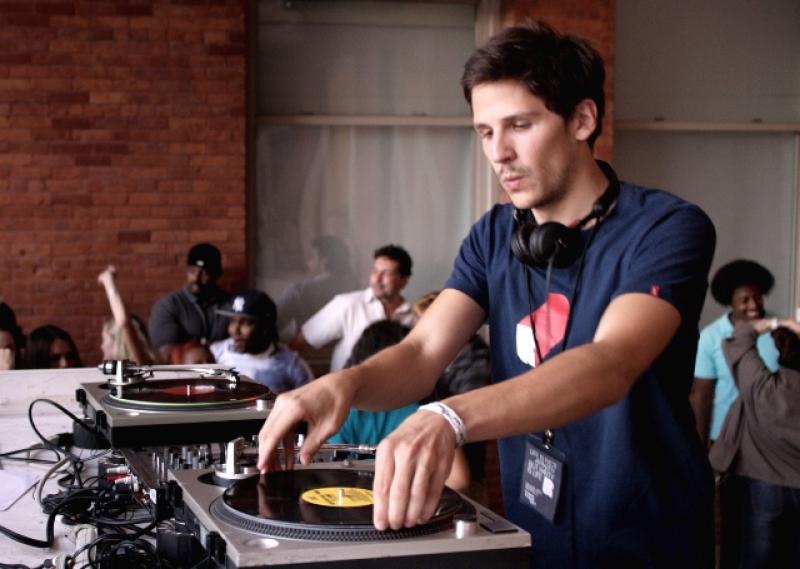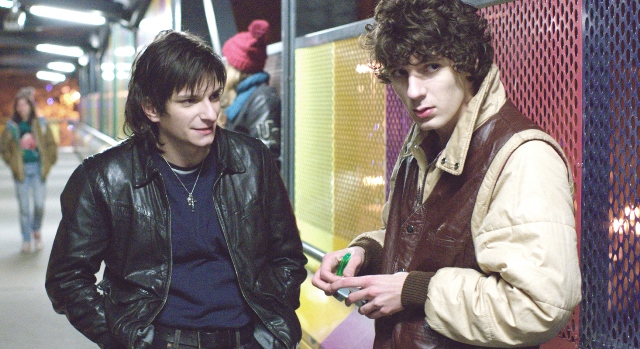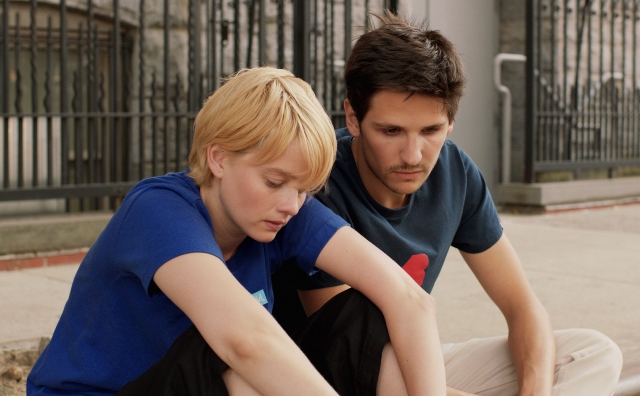Eden | reviews, news & interviews
Eden
Eden
Drab lead dominates overlong chronicle of a DJ in the Nineties French dance music scene

A film about 20 years in the life of a character acknowledged as peripheral to a movement in popular culture which spawned global stars is a difficult sell. Audiences are going to wonder whether the chronicling of a minor player not central to the bigger picture is the wrong focus.
Eden takes the factual and merges it with dramatised versions of actual events and characters. Paul (Félix de Givry in his first lead role) is an analogue of director Hansen-Løve’s former-DJ brother Sven, who co-wrote the film with her. She used to accompany him to his bookings. The title is taken from a fanzine integral to the era. Raves and club events which happened are recreated, and real-life DJs are seen in cameos. The music fundamental to the scene is heard, including tracks by Daft Punk, played by a helmetless pair of actors.
 The film charts the rise and fall of Paul in two sections, the first titled Paradise Garage, the second Lost In Music. It begins in November 1992 and ends in December 2013 with a penniless Paul, working as a vacuum cleaner salesman, returning to the writing studies he abandoned while beginning his lengthy try at making the grade as a DJ. He is last seen reflecting on Robert Creeley’s aptly titled poem The Rhythm which, in a metaphor for the film, muses on “light at the opening, dark at the closing”.
The film charts the rise and fall of Paul in two sections, the first titled Paradise Garage, the second Lost In Music. It begins in November 1992 and ends in December 2013 with a penniless Paul, working as a vacuum cleaner salesman, returning to the writing studies he abandoned while beginning his lengthy try at making the grade as a DJ. He is last seen reflecting on Robert Creeley’s aptly titled poem The Rhythm which, in a metaphor for the film, muses on “light at the opening, dark at the closing”.
Recreations of the club experience are spot on. The energy, euphoria and mass communion are captured with an effortlessness lacked by, say, 24 Hour Party People. But after a sequence of similar such scenes, the settings become repetitious. Comedic reappearances of the Daft Punk duo (pictured above right, Arnaud Azoulay, left, as Daft Punk’s Guy-Man and Vincent Lacoste as Daft Punk’s Thomas) – repeatedly refused entry to clubs because their faces and real names aren’t recognised – are also overused.
 A greater problem is Eden’s lead character: as Paul, de Givry lacks charisma. Unfortunately, he is dull, the classic club DJ: a music fanatic defined by the records he plays rather than his personality (a problem Daft Punk sidestepped by donning costumes). Although his fondness for house music shines, Paul's is not a character with whom it is easy to spend an overlong two hours 11 minutes. He bumbles through relationships and, due to his apathy, splits with the woman who may be his one true love and supporter, Louise (Pauline Etienne in the film's best performance, pictured left with de Givry as Paul). Another of his flames is a stilted Greta Gerwig. Often poor – either because he is not making money or because he spends what he has on drugs – Paul sponges off his mother.
A greater problem is Eden’s lead character: as Paul, de Givry lacks charisma. Unfortunately, he is dull, the classic club DJ: a music fanatic defined by the records he plays rather than his personality (a problem Daft Punk sidestepped by donning costumes). Although his fondness for house music shines, Paul's is not a character with whom it is easy to spend an overlong two hours 11 minutes. He bumbles through relationships and, due to his apathy, splits with the woman who may be his one true love and supporter, Louise (Pauline Etienne in the film's best performance, pictured left with de Givry as Paul). Another of his flames is a stilted Greta Gerwig. Often poor – either because he is not making money or because he spends what he has on drugs – Paul sponges off his mother.
Paul peaks by playing New York at an event organised by the Museum of Modern Art, but his approach to music and how it is played out does not develop. Evolving trends in both music and technology leave him behind. A French club owner tells him and his DJ partner Stan (Hugo Conzelmann) to change as the populist David Guetta has become the in-thing.
Although Eden’s music is infectious and accurate for the era and scene, the film itself is less enjoyable. If Paul were not so drab and unengaging, it could have been the French club scene’s Inside Llewyn Davis. Hansen-Love’s third film feels like something she had to get out of her system. Her last, the nuanced and more thoughtful Goodbye, First Love, was much more satisfying. Perhaps she can regain her focus and sensitivity for representing the human with her next one.
Overleaf: watch the trailer for Eden
Watch the trailer for Eden
rating
Explore topics
Share this article
The future of Arts Journalism
You can stop theartsdesk.com closing!
We urgently need financing to survive. Our fundraising drive has thus far raised £49,000 but we need to reach £100,000 or we will be forced to close. Please contribute here: https://gofund.me/c3f6033d
And if you can forward this information to anyone who might assist, we’d be grateful.

Subscribe to theartsdesk.com
Thank you for continuing to read our work on theartsdesk.com. For unlimited access to every article in its entirety, including our archive of more than 15,000 pieces, we're asking for £5 per month or £40 per year. We feel it's a very good deal, and hope you do too.
To take a subscription now simply click here.
And if you're looking for that extra gift for a friend or family member, why not treat them to a theartsdesk.com gift subscription?
more Film
 After the Hunt review - muddled #MeToo provocation
Julia Roberts excels despite misfiring drama
After the Hunt review - muddled #MeToo provocation
Julia Roberts excels despite misfiring drama
 London Film Festival 2025 - Bradley Cooper channels John Bishop, the Boss goes to Nebraska, and a French pandemic
... not to mention Kristen Stewart's directing debut and a punchy prison drama
London Film Festival 2025 - Bradley Cooper channels John Bishop, the Boss goes to Nebraska, and a French pandemic
... not to mention Kristen Stewart's directing debut and a punchy prison drama
 Ballad of a Small Player review - Colin Farrell's all in as a gambler down on his luck
Conclave director Edward Berger swaps the Vatican for Asia's sin city
Ballad of a Small Player review - Colin Farrell's all in as a gambler down on his luck
Conclave director Edward Berger swaps the Vatican for Asia's sin city
 London Film Festival - from paranoia in Brazil and Iran, to light relief in New York and Tuscany
'Jay Kelly' disappoints, 'It Was Just an Accident' doesn't
London Film Festival - from paranoia in Brazil and Iran, to light relief in New York and Tuscany
'Jay Kelly' disappoints, 'It Was Just an Accident' doesn't
 Iron Ladies review - working-class heroines of the Miners' Strike
Documentary salutes the staunch women who fought Thatcher's pit closures
Iron Ladies review - working-class heroines of the Miners' Strike
Documentary salutes the staunch women who fought Thatcher's pit closures
 Blu-ray: The Man in the White Suit
Ealing Studios' prescient black comedy, as sharp as ever
Blu-ray: The Man in the White Suit
Ealing Studios' prescient black comedy, as sharp as ever
 The Woman in Cabin 10 review - Scandi noir meets Agatha Christie on a superyacht
Reason goes overboard on a seagoing mystery thriller
The Woman in Cabin 10 review - Scandi noir meets Agatha Christie on a superyacht
Reason goes overboard on a seagoing mystery thriller
 London Film Festival 2025 - crime, punishment, pop stars and shrinks
Daniel Craig investigates, Jodie Foster speaks French and Colin Farrell has a gambling habit
London Film Festival 2025 - crime, punishment, pop stars and shrinks
Daniel Craig investigates, Jodie Foster speaks French and Colin Farrell has a gambling habit
 I Swear review - taking stock of Tourette's
A sharp and moving tale of cuss-words and tics
I Swear review - taking stock of Tourette's
A sharp and moving tale of cuss-words and tics
 A House of Dynamite review - the final countdown
Kathryn Bigelow's cautionary tale sets the nuclear clock ticking again
A House of Dynamite review - the final countdown
Kathryn Bigelow's cautionary tale sets the nuclear clock ticking again
 theartsdesk Q&A: Idris Elba on playing a US President faced with a missile crisis in 'A House of Dynamite'
The star talks about Presidential decision-making when millions of lives are imperilled
theartsdesk Q&A: Idris Elba on playing a US President faced with a missile crisis in 'A House of Dynamite'
The star talks about Presidential decision-making when millions of lives are imperilled

Add comment